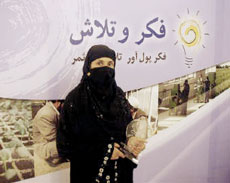KABUL: A reality TV show broadcast in Afghanistan has encouraged Afghans to start their own enterprises, stirring entrepreneurial spirits in a country that has been ravaged by three decades of war.
The program, “Fikr wa Talash,” or “Dream and Achieve” in English, is loosely based on the popular “Dragons Den” series, in which contestants pitch their business ideas to a panel of tycoons in return for cash for their companies.
The program, the latest in a series of popular reality shows that have taken Afghanistan by storm, is more than just entertainment. Its supporters hope that by encouraging small businesses, the program will help Afghanistan’s economy become more self-reliant.
“Small and medium-sized businesses, which are by far the largest employer, be it small self-employed farmers selling a surplus or a shop-keeper, trader ... are the key to achieving such self reliance,” said David Elliot, a development consultant for the program’s makers.
“Yet business skills and thinking, such as financial planning, marketing, competitive strategy, are all relatively new concepts that are needed to create a stronger, more resilient and healthy private sector, capable of being the ‘engine of growth’ for the economy,” added Elliot.
Decades of war have devastated the Afghan economy and infrastructure and Afghanistan is still one of the world’s poorest countries despite receiving billions of dollars of international aid since 2001.
The Afghan government relies on aid for about 90 percent of its total expenditure. Unemployment stands at around 40 percent with 80 percent of Afghanistan’s labor force employed in agriculture. GDP per capita stood at just $1000 in 2007.
The show’s sponsors, including US government aid agency USAID, mobile phone operator Roshan and Bank-e-Milli, saw the program as an opportunity to foster an entrepreneurial spirit among ordinary Afghans.
The first series ended in August with the final contestant winning $20,000 toward his plastic recycling business.
It was broadcast on Tolo TV, Afghanistan’s most popular channel which also aired the hugely popular Afghan Star, a homegrown version of the US singing contest, American Idol.
Reality TV shows have engrossed Afghans who in the past suffered stuffy state broadcasts and an outright ban on television under the Taleban government of the late 1990s.
“Reality TV is very big all over the world, that’s why we wanted to make something where we could both help people, get ideas and also provide entertainment,” said Masood Sanjar, a production manager for Tolo TV. The program was popular among viewers who tuned in every Wednesday night to watch contestants plug their business ideas to judges from the local business community.
“At first we couldn’t believe we got so many people,” said Sanjar. “Then we saw that after every show we would get even more people coming forward.” The show’s top five contestants represented Afghanistan’s complex and diverse social makeup, including an ex-warlord who had laid down his guns to start up a dairy. “What I really like is that one of our contestants, a former commander, still comes with 10 armed guards to the show,” said Sanjar.
“But when he goes in, there is a woman sitting there asking him questions. This shows a real balance. It shows the change of life in Afghanistan.”
The winner was Faizulhaq Moshkani, a middle-aged father of nine who owns a plastic recycling plant in his native Kandahar in southern Afghanistan.
Moshkani had shut down the factory due to the high cost of fuel to power generators. But the $20,000 prize money will enable him to move the business to Kabul where he plans to build a mini hydroelectric plant to power the new recycling factory. “I feel very good,” said Moshkani after the show. “Starting a business in Afghanistan is very easy but moving this business forward is very problematic.” Moshkani’s recycling plant will enable the recycling and production of plastic inside Afghanistan rather than relying on imports from neighboring countries such as Pakistan. “It was a great pleasure for me to start producing something in Afghanistan,” said Moshkani.
Mariam Al-Ahmadi, a 25-year-old mother of five from western Afghanistan, collected the runner-up prize of $10,000. That’s a significant amount of money in a country where half the population live on $1 a day. Five years ago Al Ahmadi set up her own jam and sauce company. Collecting fresh produce from villages and farms around her native city of Herat, she produced jars of conserves and sauces that she sold at local shops.
“After this program I can now make my business bigger. I am very happy with the result,” she said.
Al Ahmadi and another woman from Herat finished in the top five on the show, a sign of change in a country where women were not allowed to work at all, let alone run their own business, under Taleban rule which ended less than seven years ago. “
Before, people in Afghanistan, especially women, couldn’t do business,” says Al Ahmadi. “But now women have a chance.” However, Afghanistan still remains a deeply conservative country where women have been attacked and even killed just for appearing on television. Al Ahmadi dresses all in black, revealing only her eyes and insists she is doing nothing wrong.
“Some of my relatives say: “Look Mariam is a woman and she is on TV!” says Al-Ahmadi. “But I remain calm and tell them I’m appearing on television under Islam. I have my veil on!” “Every Afghan woman can work under Islamic law. Islam permits them to work,” she says.


